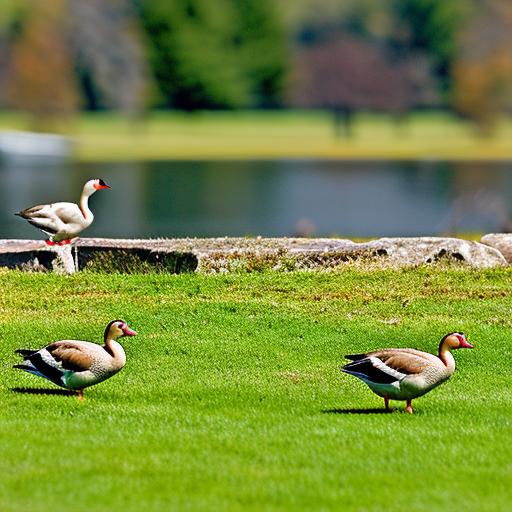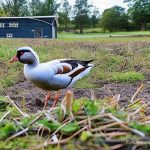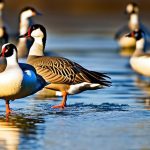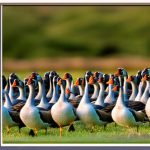Geese invading your property can be a frustrating and messy problem. These large birds can cause damage to lawns, gardens, and even pose a threat to human safety. Fortunately, there are several methods available to deter geese and keep them away from your property. In this article, we will explore different strategies to effectively deter geese and maintain a goose-free environment.
Key Takeaways
- Geese are social animals and tend to gather in large groups.
- Physical barriers such as fences and netting can be effective in keeping geese away.
- Decoys that resemble predators or other geese can trick geese into thinking it’s not safe to land.
- Natural repellents like grape concentrate or predator urine can be used to deter geese.
- Modifying your lawn by removing tall grass and reducing water sources can make it less attractive to geese.
Understanding the behavior of geese
To effectively deter geese, it is important to understand their habits and behavior. Geese are attracted to areas that provide them with food, water, and shelter. They are particularly drawn to open spaces such as lawns and golf courses where they can graze on grass and find easy access to water sources like ponds or lakes.
Geese are social animals that often travel in flocks. They have a strong sense of community and will return to areas where they have previously found food or nesting sites. Understanding these behaviors can help you develop effective strategies to deter geese from your property.
Install physical barriers to deter geese
One of the most effective ways to deter geese is by installing physical barriers that prevent them from accessing your property. There are several types of physical barriers available, including fences, netting, and floating barriers.
Fences can be installed around the perimeter of your property to create a physical barrier that prevents geese from entering. It is important to choose a fence that is at least three feet high and has small gaps between the bars or mesh to prevent geese from squeezing through.
Netting can be used to cover areas such as ponds or gardens where geese may be attracted. The netting should be securely fastened and extend over the entire area to prevent geese from accessing the food or water source.
Floating barriers can be placed in bodies of water such as ponds or lakes to create a physical barrier that prevents geese from landing or swimming near your property. These barriers are often made of floating ropes or buoys that create an obstacle for geese.
Use decoys to trick geese
Another effective method to deter geese is by using decoys. Decoys are objects that resemble geese and can be used to trick them into thinking that an area is already occupied. There are several types of decoys available, including plastic decoys, silhouette decoys, and motion decoys.
Plastic decoys are life-sized replicas of geese that can be placed in areas where geese are likely to gather. These decoys should be positioned in a way that mimics the natural behavior of geese, such as grazing or resting.
Silhouette decoys are flat cutouts that resemble the shape of a goose. These decoys can be placed in open areas such as lawns or fields to create the illusion of a flock of geese.
Motion decoys are decoys that have moving parts, such as spinning wings or bobbing heads. These decoys create the illusion of movement and can be particularly effective in deterring geese.
Utilize natural repellents to keep geese away
Natural repellents can also be used to deter geese from your property. There are several types of natural repellents available, including visual repellents, auditory repellents, and taste repellents.
Visual repellents include objects such as scarecrows, reflective tape, or balloons with predator eyes painted on them. These visual deterrents create a sense of danger for geese and can discourage them from landing or staying in an area.
Auditory repellents include devices that emit loud noises or sounds that are unpleasant to geese. These devices can be set up to activate when geese approach your property and can effectively deter them.
Taste repellents are substances that are sprayed on grass or other areas where geese may be attracted. These substances have a bitter or unpleasant taste that discourages geese from feeding on the grass or plants.
Modify your lawn to make it less attractive to geese
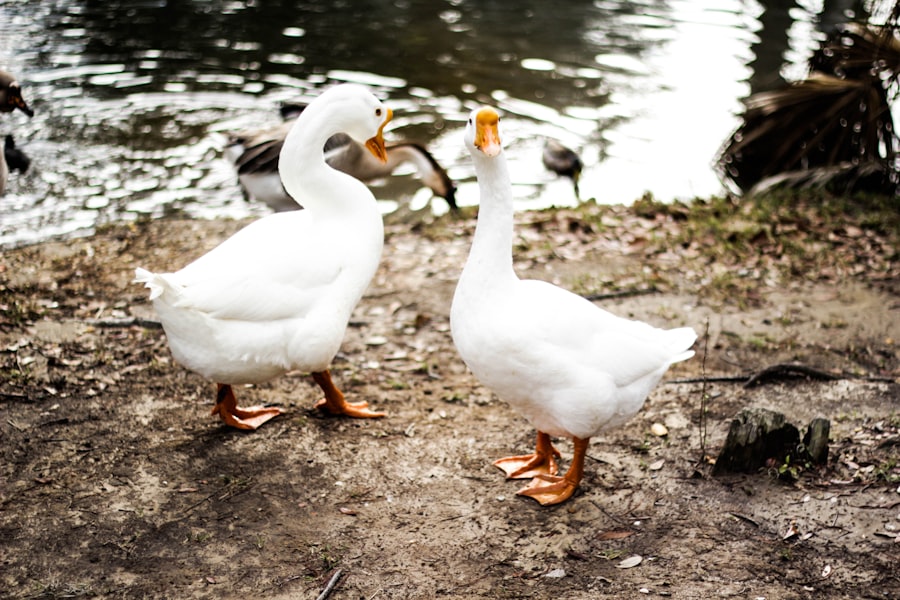
Modifying your lawn can also help deter geese from your property. Geese are attracted to well-maintained lawns with short grass, as it provides them with easy access to food. By making your lawn less attractive to geese, you can discourage them from staying in the area.
One way to modify your lawn is by allowing the grass to grow longer. Geese prefer short grass, so allowing the grass to grow longer can make your lawn less appealing to them. Additionally, you can create obstacles on your lawn, such as rocks or shrubs, to make it more difficult for geese to access the grass.
Another way to modify your lawn is by reducing the amount of water available. Geese are attracted to areas with water sources, so by reducing the amount of water on your property, you can discourage them from staying. This can be done by fixing any leaks in sprinkler systems or draining any standing water.
Consider using a motion-activated sprinkler system
A motion-activated sprinkler system can be an effective deterrent for geese. These systems use motion sensors to detect when geese are approaching and activate a sprinkler that sprays water in their direction. The sudden burst of water startles the geese and encourages them to leave the area.
To install a motion-activated sprinkler system, you will need to place the sprinklers strategically around your property, focusing on areas where geese are likely to gather. The motion sensors should be positioned in a way that they can detect movement from a distance and activate the sprinklers accordingly.
It is important to regularly check and maintain the motion-activated sprinkler system to ensure that it is functioning properly. This includes checking for any leaks or malfunctions and adjusting the sensitivity of the motion sensors as needed.
Train your dog to chase away geese
Training your dog to chase away geese can be an effective and natural way to deter them from your property. Geese are naturally afraid of predators, and the presence of a dog can discourage them from landing or staying in an area.
To train your dog to chase away geese, you will need to start by introducing them to the presence of geese in a controlled environment. This can be done by taking your dog to a location where geese are present, such as a park or lake, and allowing them to observe the geese from a distance.
Once your dog is comfortable around geese, you can begin training them to chase the geese away. This can be done by using verbal commands or hand signals to encourage your dog to approach the geese and make them fly away.
It is important to note that not all dogs are suitable for chasing away geese. Some breeds have a natural instinct to hunt or retrieve, while others may not be interested in chasing geese. It is important to consider your dog’s temperament and training abilities before attempting to use them as a deterrent for geese.
Seek professional help from a wildlife control company
If you are unable to effectively deter geese from your property using the methods mentioned above, it may be necessary to seek professional help from a wildlife control company. These companies specialize in humane and effective methods of deterring geese and can provide you with expert advice and assistance.
When choosing a wildlife control company, it is important to do your research and find a reputable company with experience in dealing with geese. Look for companies that are licensed and insured, and ask for references or testimonials from previous clients.
A professional wildlife control company will assess your property and develop a customized plan to deter geese. They may use a combination of physical barriers, decoys, natural repellents, and other methods to effectively deter geese and keep them away from your property.
Practice consistent and persistent methods to deter geese
To effectively deter geese from your property, it is important to practice consistent and persistent methods. Geese are persistent animals that will continue to return to areas where they have found food or nesting sites. By consistently implementing deterrent methods, you can discourage geese from staying on your property.
This includes regularly checking and maintaining physical barriers, decoys, natural repellents, and other deterrent methods. It is important to repair any damages or malfunctions promptly and replace any decoys or repellents that have become ineffective.
Consistency is key when it comes to deterring geese. By consistently implementing deterrent methods, you can create an environment that is unattractive to geese and encourage them to find alternative locations.
Stay informed about local laws and regulations regarding geese control
It is important to stay informed about local laws and regulations regarding geese control. In some areas, there may be restrictions or guidelines in place regarding the use of certain deterrent methods or the removal of geese.
Before implementing any deterrent methods, it is important to research and understand the laws and regulations in your area. This can be done by contacting local wildlife agencies or consulting with a professional wildlife control company.
By staying informed about local laws and regulations, you can ensure that you are using legal and ethical methods to deter geese from your property.
In conclusion, deterring geese from your property requires a combination of strategies and consistent effort. By understanding the behavior of geese, installing physical barriers, using decoys and natural repellents, modifying your lawn, utilizing motion-activated sprinkler systems, training your dog, seeking professional help when needed, practicing consistency and persistence, and staying informed about local laws and regulations, you can effectively deter geese and maintain a goose-free environment. Take action today to protect your property from geese invasion.
If you’re looking for ways to keep geese off your lawn, you might also be interested in learning about feeding ducks. Poultry Wizard has a helpful article on what you should feed ducks, which can provide insights into attracting ducks to a specific area and potentially diverting their attention away from your lawn. Check out the article here for more information. Additionally, if you’re considering building a coop to house your chickens, Poultry Wizard offers ideas for large chicken coops and A-frame chicken coops. These resources can be valuable in creating a designated space for your chickens and minimizing their presence on your lawn. Explore the articles on large chicken coop ideas here and A-frame chicken coops here.
Meet Walter, the feathered-friend fanatic of Florida! Nestled in the sunshine state, Walter struts through life with his feathered companions, clucking his way to happiness. With a coop that’s fancier than a five-star hotel, he’s the Don Juan of the chicken world. When he’s not teaching his hens to do the cha-cha, you’ll find him in a heated debate with his prized rooster, Sir Clucks-a-Lot. Walter’s poultry passion is no yolk; he’s the sunny-side-up guy you never knew you needed in your flock of friends!

